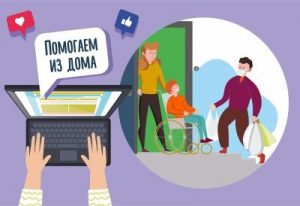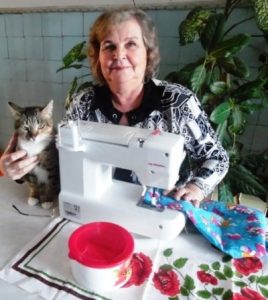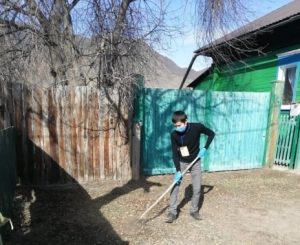“In lockdown, don’t feel down”: Russia’s community foundations get creative with Covid-19 response
13 May 2020
While the experience of the Covid-19 lockdown in Russia has varied from one region to another, community foundations across the country have been consistent in their response, demonstrating leadership, mobilizing different parts of the community, raising funds and supporting local non-profits and vulnerable groups. Here are some of their stories.
Coordinating corporate giving in Arkhangelsk
“We started receiving many calls from local entrepreneurs who were ready to help people in difficulty,” notes Marina Mikhailova, Director of the Arkhangelsk Centre of Social Technologies, ‘Garant’, “and now we are cooperating with most of them.”
Through the Time to Be Kind campaign, Garant is partnering with a local café and an NGO working with the mentally disabled. When a customer places an order for food, they are given the option of purchasing a “Kind Lunch” for 200 roubles (around US $2.70) or a “Kind Gingerbread Cookie” for 100 roubles (US $1.35). The money raised from sales goes towards organizing meals for the mentally disabled. Along similar lines, a local bakery has committed to donating a proportion of its sales to Garant to support the needs of Arkhangelsk’s elderly, a chain of cafés has offered meal coupons for those in need, and a pizza restaurant is offering donations of food.

The foundation’s “Helping From Home” poster appears on front doors across Arkhangelsk
“It is important for us that everyone who needs support receives it, but that we avoid a situation in which a few people are helped multiple times and others not at all,” explains Marina. “At Garant, our role has been to play a coordinating role between local businesses that are donating, compiling lists, and making sure that different target groups are covered.”
As well as coordinating Covid-19 response among businesses, Garant has launched both a small grants programme for local NGOs and the “Power Together” initiative, through which community members are encouraged to hang posters on their front doors to signal their readiness to help neighbours in need.
Mapping and responding to the needs of local non-profits in New Angarsk

“We are Angarchans” volunteers
At the beginning of the lockdown period, the New Angarsk Foundation launched a mutual assistance programme for non-profit organizations in its city. 50 non-profit-organizations completed a survey regarding the challenges they were facing and the foundation followed up by organizing an online gathering to discuss these issues further.
“After analyzing all of the data, we also began to work individually with each organization, providing tailor-made assistance. Some asked for advice on how to work remotely, some needed help in coping with this new, stressful situation,” notes Alina Ionova, Executive Director of the New Angarsk Foundation. “We have also been speaking to a range of local businesses, looking for more resources that can be channelled directly to the non-profits in our network.”
The foundation plans to hold a series of regular online meetings for its partners, with invited speakers. The first has already been arranged. “We were fortunate,” Alina shares. “Many of our colleagues were expressing a need for psychological support. At the same time, the Baikal Nordic Walking Association approached us, as they are experiencing financial difficulties under lockdown. The Association actually happens to have a psychologist on staff, so we invited him to speak in our online gathering. In turn, the small fee that we paid him helped to fill their organization’s budget deficit too. So, we did two good deeds at once: identified an expert to help our colleagues in need, while also supporting a long-term partner!”
In addition, together with the Angarsk Red Cross, the foundation has launched an aid campaign during the Covid-19 pandemic called We are Angarchans. Its goal is to support people in crisis with grocery baskets and personal safety apparel.
Perm’s Sodeistvie looks out for the elderly

Shustova L.F., a articipant of the project “In lockdown – don’t feel down!”
At the beginning of lockdown, the Social Initiatives Support Fund, Sodeistvie launched a WhatsApp group aimed at reaching the community’s elderly. Though the group, Sodeistvie has been able to provide health and safety information to members, as well as to keep in regular touch with them. Sodeistvie’s partners are also able to share important information through the WhatsApp group: the Perm branch of Sberbank, for example, has communicated practical tips on how to avoid fraud, and how to use a mobile application to carry out basic banking functions.
Through its long-running VKontakte social network group, Sodeistvie also disseminates announcements of activities for seniors, and shares inspiring stories of active grandparents in the region. “The elderly from small towns and villages have become real generators of ideas in lockdown,” says Nina Samarina, President of the Fund. “For example, in the Nozhovsky rural settlement of the Chastinsky district, a community of older people launched the campaign In Lockdown Don’t Feel Down! The group is engaged in education, sports and crafts to keep busy and active, and the campaign is encouraging others to get involved and to stay active. Some in the group are even now sewing protection masks, to pass them on to people in need.”
Mobilizing volunteers in Russia’s Far East

A poster in a shop says “Let’s Help Together”, encouraging donations of food
In Vladivostock, a key concern of the City Charitable Foundation ‘Razvitie’ has been to reach the most vulnerable members of the community during the lockdown. Together with the Timchenko Foundation and the Horoshie Istorii Foundation, the foundation has launched the initiative Care Is Nearby. “Our task is to find the ‘invisible’ people in our community – particularly the elderly, and especially those who do not receive support from social services,” explains foundation Director Svetlana Bazhenova. “We have been trying to identify them by putting out a call on social media, asking our friends, and contacting NGOs in our network. Over the first two days of these efforts, we received the contact details of more than 60 individuals who needed help. We prepared and delivered food baskets to every single one.”
Entrepreneurs across Vladivostok city are contributing by collecting groceries. They have united around the project Let’s Help Together and daily deliver about 120 food packages with the help of volunteers. To complement this, the foundation launched its Basket of Kindness campaign in collaboration with the Remy supermarket chain. In baskets posted near the supermarket doors, everyone is encouraged to contribute food items to help those in need. A team of volunteers then assist with the packing and delivery of the food baskets, which also include leaflets with information on where additional support can be accessed.
Advocating for the third sector in Pskov
Soon after the effects of Covid-19 were beginning to be felt in Russia, the Centre for Sustainable Development of Pskov Oblast conducted a survey among more than 30 of their non-profit partners, with the aim of learning about how the situation had affected their activities, and what kinds of support would be needed most. The response reflected the concerns of many in Russian’s non-profit sector: a lack of skills when it came to working virtually and a concern about how to cover core costs.
The Centre analyzed the results of the survey and developed a series of proposals aimed at supporting the third sector in the region. These were then sent on to the Governor of the Pskov Region, as well as to the Public Chamber of the Russian Federation.
“There is no answer yet, but we did everything we could to join forces and be heard,” says Semyon Nikonov, Chairman of the Centre. “NGOs in our region, and their employees, are truly worthy of support. They are continuing to do their jobs in extremely difficult circumstances, providing vital services to people in need in our communities: volunteering, offering online legal advice, coordinating food and clothes donations, staffing hotlines, providing free counselling for citizens, and much more.”
Throughout the lockdown period, the Centre has also been providing direct support to the community, by collecting food and assembling care packages in cooperation with other actors, such as the Give Food Foundation. The prepared packages are handed over to humanitarian organizations – for example, the Russian Red Cross – that are working with the most vulnerable. During the first week of this work, 176kg of food gathered by the Centre was distributed.
Non-Profit Community Foundation of Maima Rural Settlement “Perspektiva” rallies social media support

The #DoKindness hash-tag has inspired residents to help neighbours with different tasks
The first community foundation in the Altai Republic, the Non-Profit Community Foundation of Maima Rural Settlement ‘Perspektiva’, has launched two Instagram campaigns during the lockdown period: one being #TvoiDobro (#DoKindness) and the other #RazberiShkaf (#SortOutWardrobe).
By following the hash-tags, local residents can be kept informed about different ways that they can help their community, such as where and when to give blood, or where donations of various items (food, clothes, supplies, etc.) can be collected so that they reach people in need. “People respond, donate blood, and bring clothes, utensils and other things,” says Olga Volosovtseva, President of Perspektiva. Using the same hash-tags, residents are also sharing their own stories of giving and generosity online, building a community of people that care for each other. “We are also calling on people in our community to undertake other kind deeds that can be done without leaving the home. For example, using the hash-tags to share useful tips for how to cope with self-isolation.”


